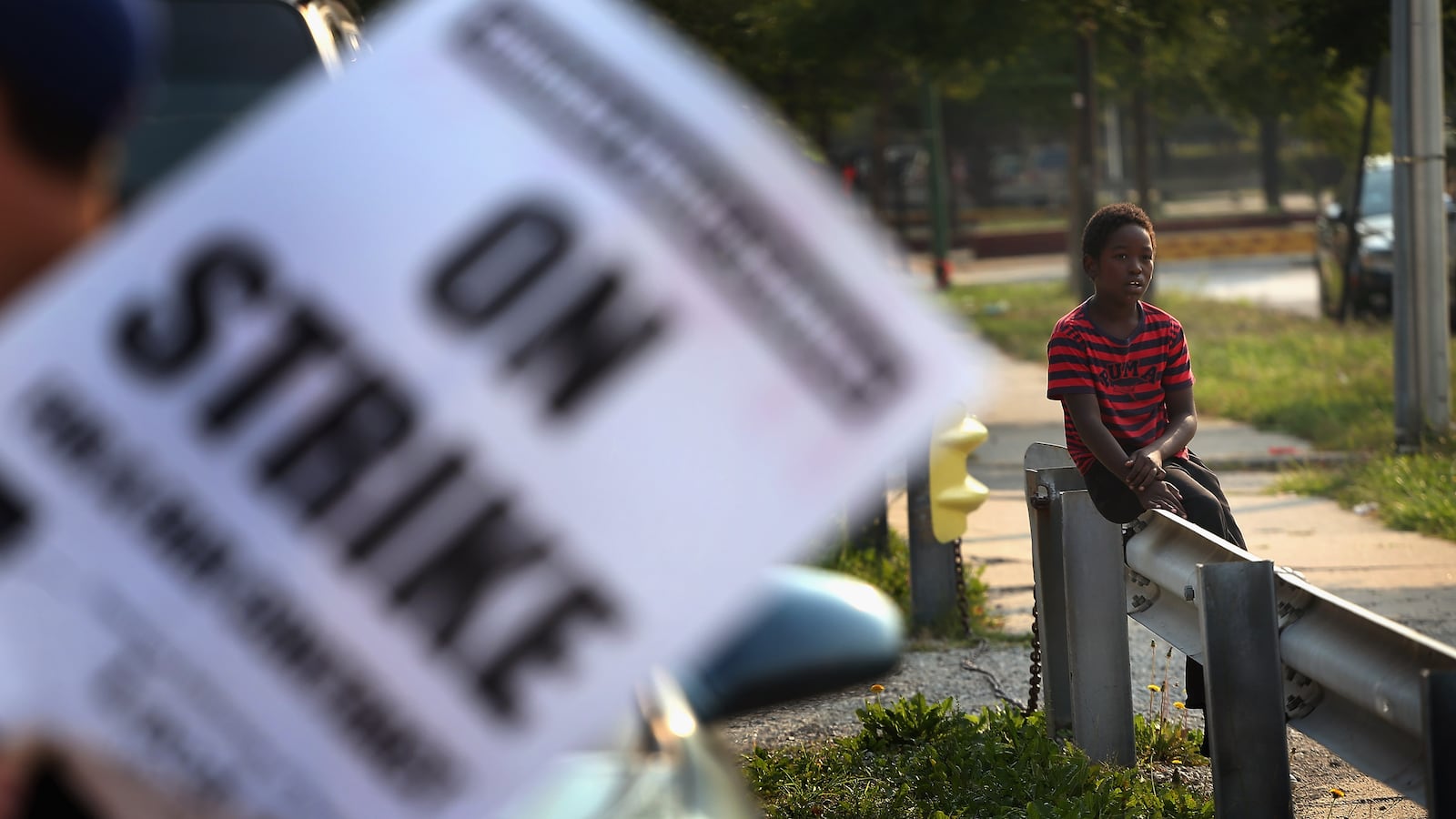No deal was reached over the weekend, so bargaining between the Chicago Teachers Union and City Hall was set to continue Monday as a large teachers’ rally took shape for the afternoon.
Schools are closed Monday for Columbus Day/Indigenous People’s Day.
After Chicago Mayor Lori Lightfoot made public a new offer on Friday, the Chicago Teachers Union summarily rejected it.
A deal so far remains elusive in separate negotiations between Service Employees International Union Local 73 and the city. If the city’s 25,000 teachers walk off the job Thursday, it’s possible that 10,000 teachers’ aides, bus drivers, and other support staff could join them, along with park district workers who are also SEIU members.
One of the issues here is that Lightfoot and schools chief Janice Jackson fundamentally disagree with the union about the scope of what should be on the table during contract negotiations. Lightfoot this week put a sign outside of her City Hall office that said it had been 142 days since she’d last received a union counterproposal. The union said it did respond — and that the city’s focus on pay and benefits is way too narrow.
Chicago Teachers Union President Jesse Sharkey said Thursday that a last-minute deal was unlikely, and that some agreement must be reached in time to call a vote of the 700-member House of Delegates, which would ratify or reject a deal.
But what’s the back-and-forth actually about, policywise? Here’s everything we know so far about the Chicago strike threat, as well as what we can learn from past actions in 2012 and 2016.
It’s about policy, not just pay.
- The pay issue has not yet been resolved. See here how Chicago pay stacks up with salary schedules in other large districts.
- The union, however, has said the bargaining is not just about salaries, but also about other critical issues it has brought to the negotiating table. That strategy, honed in Chicago, is known as “common good’ bargaining. Here’s how it factored into a win for Los Angeles teachers.
- A major point of contention: In a high-need district where 14% of students have been identified for special education services, should a number of additional support staff — such as nurses and social workers — be enshrined in the contract? The mayor has vowed to increase staffing as part of a five-year plan she unveiled in late July. Chicago Public Schools also pledged to decrease reliance on privatized nursing services that parents complain lack quality and consistency. The union has challenged her timeline and demanded promises be put in writing.
- The city’s latest offer, made public Friday, put more money on the table for these critical positions. The union said it was not enough.
- Class sizes have emerged as another crucial issue. Chicago has class size caps but does not enforce them. The union wants lower caps — and compensation to teachers when they are exceeded. Chalkbeat looks at the issue here.
- There’s also been discord over teacher prep time, how much to give teachers, and how much principals should have a say in how it’s used. Additional prep periods could affect school start times, effectively resulting in a shorter instructional day. We talked to teachers about prep time and explained the latest twist in the conflict.
- Other broad social issues have emerged as well, such as affordable housing.
- One of the few areas of agreement is a contract measure that would declare schools sanctuaries from immigration enforcement.
Parents face a triple whammy
- During past strikes and one-day walkouts, Chicago families have relied on support staff and park district centers to help with child care. Lightfoot has said that schools will remain open and staffed by principals and central office personnel, even if support staff are out on the picket line. Here’s more about Chicago’s contingency plans.
- This has raised many questions for parents, who’ve asked us about average strike lengths, services for students with individualized education programs, and other questions. Find them asked and answered here. Have a question you don’t see addressed? Send it our way: chicago.tips@chalkbeat.org.
- Some community groups have begun offering camps and day care activities. Here’s a running list of contingency plans we know about so far.
- Parents of children with special needs face particular challenges during strikes. Chalkbeat Colorado examined their issues when teachers in Denver went on strike earlier this year.
The likelihood of a walkout is growing
- Both of the major newspapers have editorialized in favor of City Hall’s latest offer, but that hasn’t quieted the union’s call. Here’s our #TrackingtheContract that chronicles day-to-day developments.
- Chicago has been here twice in the past decade, with a seven-day strike in 2012 and a short-lived walkout in 2016 that ended with a last-minute settlement. In some ways, 2019 has echoes of both 2012 and 2016. We looked back at the past to see if similar pitfalls can be sidestepped.
- Who’s actually sitting at the bargaining table? The Sun-Times has this guide.
- Could Chicago’s pattern of rocky October weather dampen enthusiasm? Not likely. It rained the first day of the L.A. strike, and teachers still turned out in droves. Chalkbeat was there.

